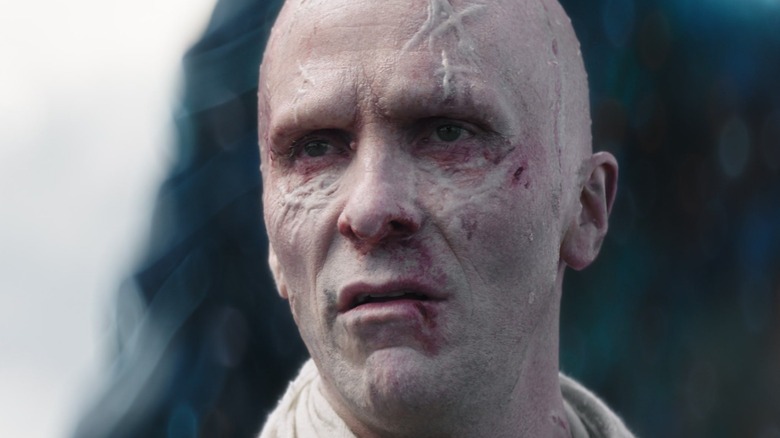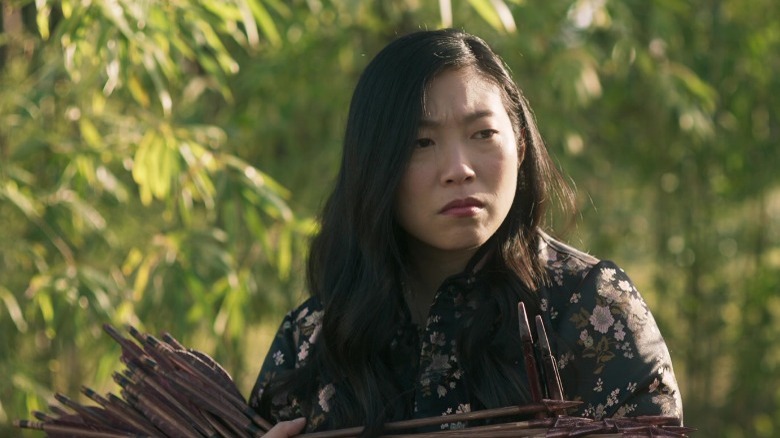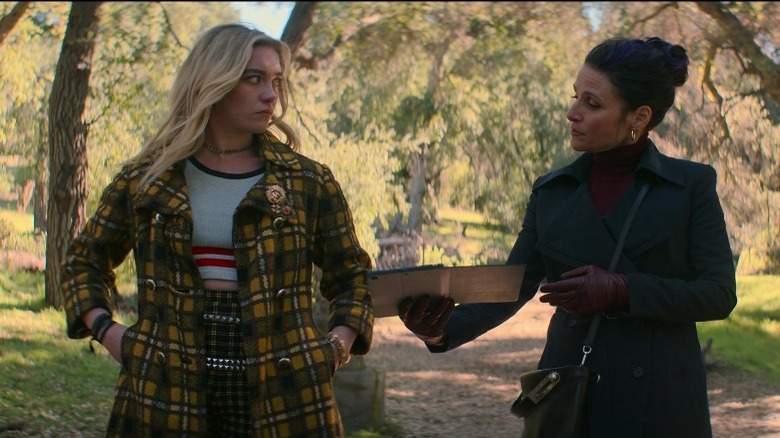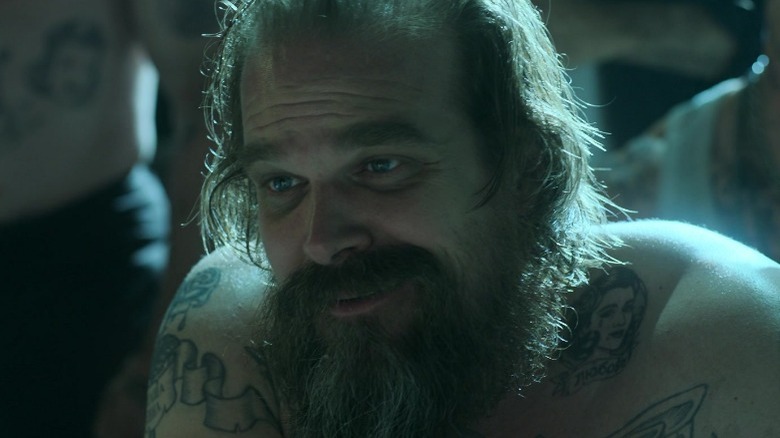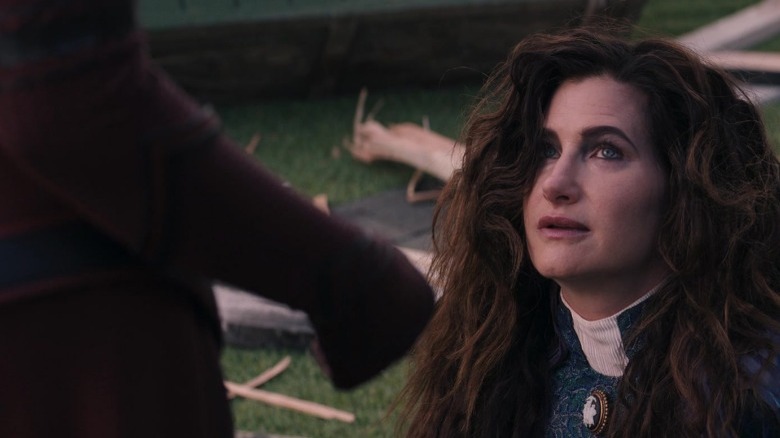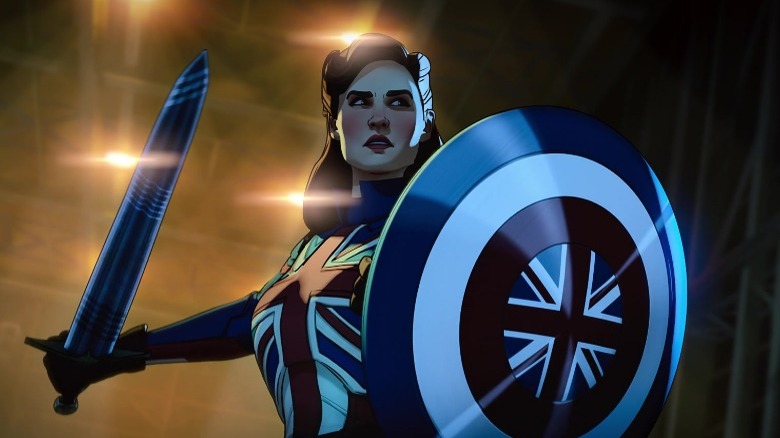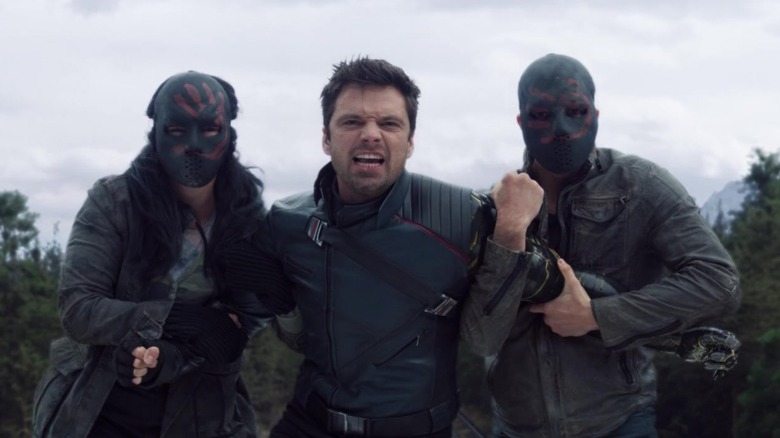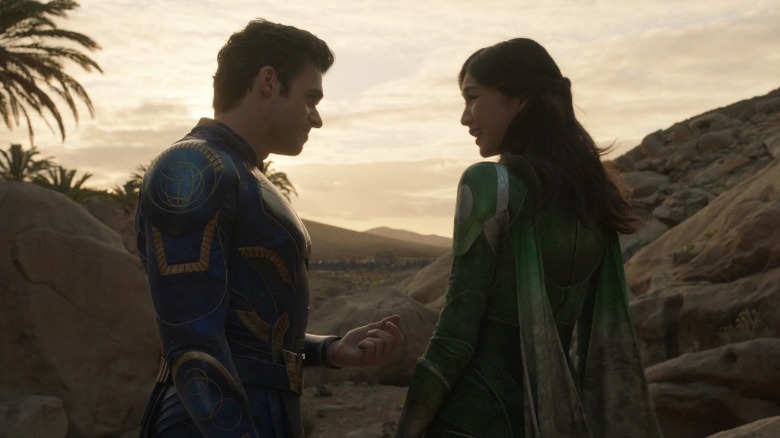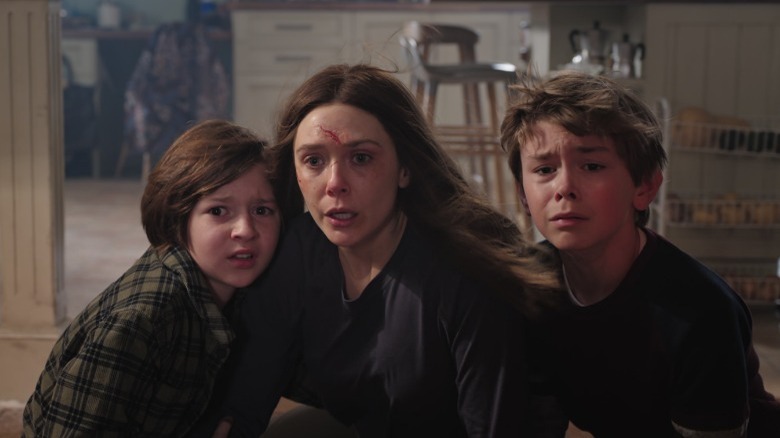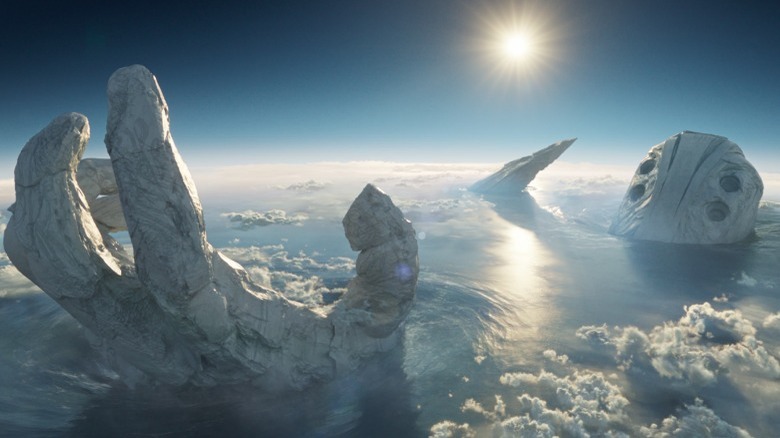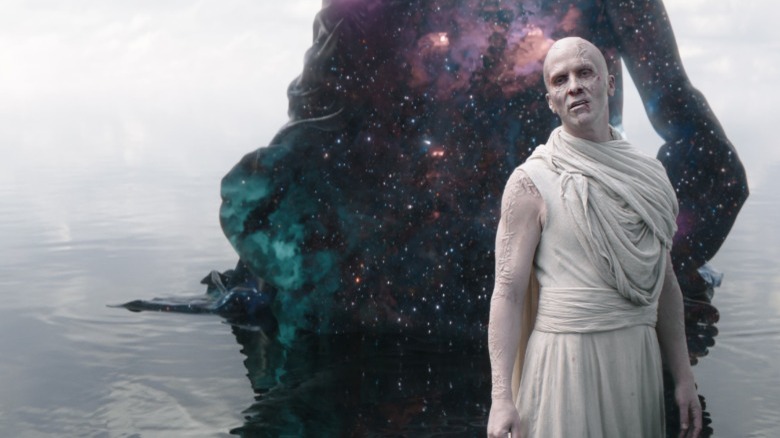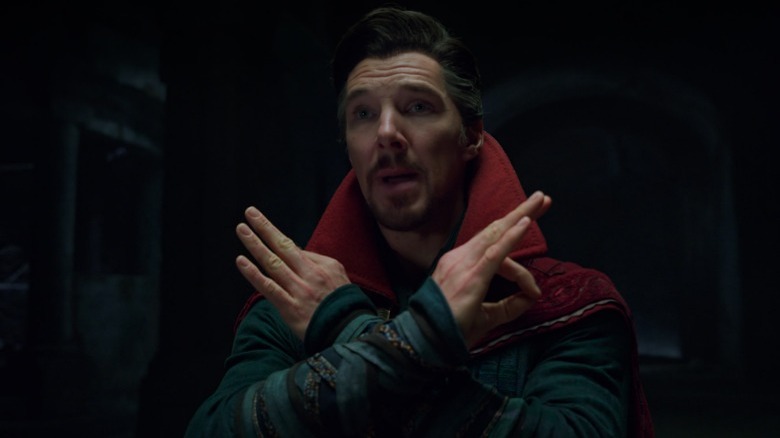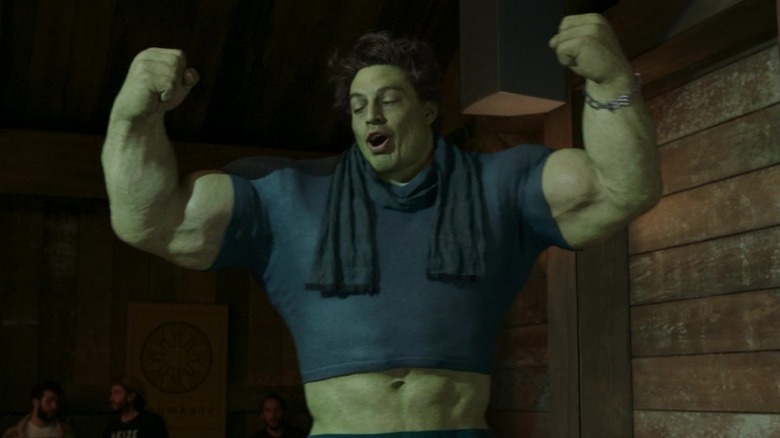Things In Marvel's Phase 4 That Didn't Make Any Sense
There's little arguing that Marvel is among the dominant forces in pop culture, across both movies and television — but if you think about it, a lot of things from the Marvel Cinematic Universe make no sense, especially if examined out of context.
For instance, it's a little hard to buy that Steve Rogers (Chris Evans) survived frozen in the ice for decades and then emerged not a day older. On top of that, fans are asked to accept that the gods from Norse legends are actually space Vikings from another planet. Sure, why not? Throw in a blue alien with a Southern accent and a planet-chomping being who sometimes looks like David Hasselhoff, and you end up with a world that might sound nonsensical to somebody who's never read a comic book before. Not making sense is simply part of the package, and it hasn't stopped millions of fans from enjoying Marvel movies.
There are, however, still a handful of moments that don't even make sense according to the rules already established in the MCU. From MacGuffins that are way more powerful than they ought to be, to apocalyptic threats forgotten when they're no longer on-screen, here is every time Phase Four (the 2021 – 2022 period beginning with "Black Widow" and concluding with "The Guardians of the Galaxy Christmas Special") tested its audience's suspension of disbelief.
Katy suddenly getting good at archery
In "Shang-Chi and the Ten Rings," Katy (Awkwafina) is a regular human with no superpowers, no combat training, and no experience with the supernatural. Her relative normalcy, frankly, is what makes her endearing.
But after she spends little more than a day practicing archery with Guang Bo (Wah Yuen) in Ta Lo, she displays Hawkeye-level skills in battle. According to the YouTube channel How It Should Have Ended, it would have been a little easier to forgive this lazy plotline if the film's entire climax didn't hinge on Katy making a one-in-a-million shot that nails the Dweller-in-Darkness in the throat.
It's worth noting that the comic "Shang-Chi #7" offers an explanation, one that the movie neglected to include. According to the comic (via The Independent), even normal people like Katy are inured with a handful of superhuman abilities the instant they set foot in the realm of Ta Lo. One such ability is a special talent for archery. Okay, so why did Katy even need to train?
That's a slightly better excuse, but no matter how you slice it the whole thing is silly. Also, since the comic was released a few months after the movie, for some fans that explanation was too little, too late.
Yelena believing Hawkeye killed Black Widow
It was awesome to see Yelena (Florence Pugh) grace the screen in the "Hawkeye" TV series, but the reason for her appearance was quite flimsy indeed. It all came down to a misunderstanding; if the characters would have stopped hitting each other in the face and simply had a conversation, it could have been sorted out in 2 minutes rather than across 6 episodes.
Supposedly, Valentina (Julia Louis-Dreyfus) made Yelena think Hawkeye (Jeremy Renner) was responsible for the death of Black Widow (Scarlett Johansson). So Yelena spent the series trying to assassinate Hawkeye, only to accept much (much) later that it wasn't his fault.
As fans have now seen in several Marvel adventures, Yelena is no dummy. So, it's difficult to believe she could know so much about her target, yet not give him the benefit of the doubt about Natasha's death. After all, the events of "Avengers: Endgame" appear to be known to the general public.
The Direct points out that Scott Lang (Paul Rudd) must have revealed key details about the final battle against Thanos (Josh Brolin) in a podcast interview, because Kamala Khan (Iman Vellani) was able to describe the fight pretty much play-by-play. So why didn't Yelena know the truth? Does she prefer audio books? It's possible that the final battle at the Avengers Compound is common knowledge, but the Time Heist was kept under wraps.
But even folks who didn't know about the Time Heist could easily guess that Black Widow simply died fighting Thanos. It seems like a quick Google search would have cleared up Yelena's misunderstanding. The only way it begins to make sense is if Yelena simply refused to accept the answers to even cursory internet research; perhaps, she was just looking for someone to blame. But if that's true, Marvel didn't lay that groundwork so much as expect the fans to do all that heavy lifting.
Then, there's another potential Yelena plot hole: Who exactly hired her to kill Clint? Valentina or Eleanor (Vera Farmiga)? We'll likely never know.
The Red Guardian claiming he fought Captain America
In the prison scene from "Black Widow," Alexei Shostakov (David Harbour), aka the Red Guardian, brags about beating Captain America and taking his shield. Marvel fans will know this is absolute rubbish. Alexei claims he clashed with Steve Rogers in the early 1980s, but anyone could tell you that Steve would have been a popsicle at the time; he was frozen in ice from World War II until the year 2011.
Later, Alexei describes Captain America as his "contemporary," even though the two were never in-action at the same time until recently. To Marvel's credit, the film openly acknowledges this inconsistency, as Alexei's fellow inmate calls B.S. on the whole story. Still, "Black Widow" never explicitly confirms what really happened.
/Film posits that maybe the Red Guardian actually crossed paths with Isaiah Bradley (Carl Lumbly), who was given the Super Soldier Serum and was even sent out in the field, but was never rightfully acknowledged as the next Captain America. It's possible Alexei could have fought him and mistaken him for Cap. Since the U.S. government completely hid Bradley's existence, this is at least plausible. Then again, "The Falcon and the Winter Soldier" suggests Bradley was only sent on missions during the Korean War and was imprisoned for the next 30 years, which doesn't line up with Alexei's story.
Of course, the most likely explanation is that the Red Guardian is simply telling tall tales to make himself look like a tough guy. Which certainly fits his persona.
How Wanda keeps Agatha imprisoned
At the end of "WandaVision," Wanda (Elizabeth Olsen) defeats Agatha (Kathryn Hahn) by casting runes on the Hex barrier to prevent Agatha from using her magic. So long as Agatha is inside the circle of runes, only Wanda can cast spells. However, when Wanda allows the Hex to collapse, it seems like Agatha is no longer inside the circle of runes. So then, what happens to Agatha? Does she simply disappear along with the Hex? Is she stuck forever as Agnes in the real-life Westview, even though none of the other residents of Westview are under Wanda's control? As far as anyone can tell, Agatha should be able to break free from Wanda's spell.
Ryan Arey from ScreenCrush theorizes that it doesn't matter if Agatha is outside the Hex, because Wanda cast a spell on her while she was still inside the Hex to trap her inside the mind of "Agnes." Once Agatha becomes Agnes, argues Arey, she has no free will and presumably can't cast any spells. Still, that explanation may not hold up to scrutiny, since Agatha had previously told Wanda, "My thoughts are not available to you. They never, ever were." So far, only Wanda's runes seem to have had any effect on Agatha.
Of course, it's possible that this plot hole was completely intentional. After all, Agatha is set to return in her own series "Agatha: Coven of Chaos." It's hard to imagine the Marvel series unfolding without some sort of explanation of her "WandaVision" aftermath.
The Tesseract sending Captain Carter to the future
In the first episode of "What If...?" the Red Skull (Ross Marquand) uses the Tesseract to create a portal in hopes of unleashing a monster. Captain Carter (Hayley Atwell) manages to stop the creature, but not before passing through the portal and getting stranded in the twenty-first century. At a glance, this plot point makes sense, as viewers will remember Steve Rogers traveling to the twenty-first century at the end of "Captain America: The First Avenger." Since it wouldn't have made sense in this context for Captain Carter to be frozen in ice for decades, "What If...?" uses a different plot device to bring her to the present day. However, there's one small problem: the Tesseract doesn't work that way.
QuirkyByte calls out this mistake. Canonically, the Tesseract has been established as something that can be used to travel through space, not time — that's why it's called the Space Stone. Yet somehow, Captain Carter hurtles through space and time, ending up almost 70 years in the future. If the Space Stone could actually allow the wielder to travel through time, then that would have changed everything. For instance, Thanos would have been much more powerful when he held only two Infinity Stones in the beginning of "Infinity War."
But hey, the series is called "What If...?" after all. Maybe the Infinity Stones operate according to different rules in Captain Carter's universe?
The Avengers never intervening
The world was in jeopardy countless times throughout Phase 4 of the MCU, ranging from a Celestial's emergence to a cracked multiverse to the Noor Dimension nearly obliterating Earth. Throughout all this, where were the Avengers? You'd think Dr. Strange (Benedict Cumberbatch) or Wong (Benedict Wong) would have noticed Wanda's Chaos Magic at Westview, or Rhodey (Don Cheadle) would've lent Sam Wilson (Anthony Mackie) a hand after seeing that the Flag Smashers were a real threat. But nope, apparently they were taking some time off.
To be fair, this may simply be a side effect of the MCU expanding. The Avengers can't be everywhere at once, and even if they could, all these shows and movies would only become extremely crowded.
Ultimately, it's better for the Marvel films and shows to focus on each superhero in their own little corner of the world. ScreenCrush observes that the world was in danger plenty of times before Phase 4 without the Avengers showing up — just look at "Thor: The Dark World" and "Captain America: The Winter Soldier." At least in Phase 4, there is a good reason for the absence of the Avengers, as most of the original crew are scattered and no longer in touch.
Even still, it might be nice if the MCU acknowledged that the Avengers were at least paying attention, perhaps by including a cameo of a single Avenger who happens to be nearby whenever danger strikes, suggests BGR.
The Eternals never intervening
Sometimes, by trying to resolve one plot hole, you create another.
Comic book fans probably weren't terribly concerned about the Eternals not responding to the threat of Thanos; then the movie felt the need to bring up their absence. In the comics, the Eternals always keep a low profile, so it's really not that surprising that they would sit out the Thanos conflict. Agatha Harkness, similarly, is a powerful being who has lived for centuries, but you don't see anyone asking where she was during "Infinity War." By attempting to offer an explanation for the absence of the Eternals, it only ended up raising more questions.
The non-intervention policy of the Eternals comes directly from their Celestial masters, who ordered them to never interfere with human matters unless the Deviants were involved. Even though the Eternals might have been able to create world peace, they instead allowed humans to wage war because war frequently results in technological advancements? And with these advancements, the population of the planet increases — making it the perfect incubator for a young Celestial?
We Got this Covered argues that such an explanation doesn't add up. When Thanos got his hands on the Infinity Gauntlet, he planned to eliminate half the universe's population. That would throw a huge wrench into the Celestials' plans, likely delaying the Emergence of Tiamut for centuries to come. It was in the best interest of the Celestials for the Eternals to step in, yet none of them lifted a finger. So, perhaps this elephant in the room would have been best left unacknowledged.
Vision's absence in Multiverse of Madness
Part of the appeal of "Dr. Strange in the Multiverse of Madness" was the chaos springing from all that universe-hopping, so it's easy to forgive any details that don't make sense. It's supposed to be madness, after all.
However, there is one plot hole from "Multiverse of Madness" that's a little distracting: where is Vision (Paul Bettany)? For the entire movie, Wanda seems to forget about Vision; instead she is only concerned with finding Billy (Julian Hilliard) and Tommy (Jett Klyne) from an alternate universe. Once Wanda finds her kids on Earth-838, Vision is never shown on-screen. Even in the climax, when Billy and Tommy fear for their lives from the Scarlet Witch, Wanda-838 rushes to their rescue, while Vision is nowhere to be found.
It's possible there's a story reason for this. Perhaps on Earth-838, Vision still died, but not before Wanda became pregnant with the twins. Or perhaps the filmmakers simply didn't want to repeat the same beats as "WandaVision," which focused primarily on Wanda's relationship with Vision. Maybe Marvel wanted to show that Wanda had moved on from the loss of Vision (so as not to reverse her character growth in "WandaVision") yet still couldn't get over the loss of her children. Quite simply, the reason is likely that Vision offers a counterbalance to Wanda's more terrifying personal shortcomings, and this is a film that had little use for her being counterbalanced.
Still, BGR argues that the presence of Vision could have elevated this film, and there is no clear reason why he is simply absent.
The Celestials only appearing when it's convenient
One particularly frustrating plot hole in the MCU isn't unique to Phase 4, but it is the phase where the problem becomes most apparent. During Phase 3's "Guardians of the Galaxy, Vol. 2," the Celestial Ego (Kurt Russell) almost consumed the entire Earth without the Avengers even noticing. Unlike the 2012 Chitauri invasion or the Sokovia Accords, this world-threatening event is never acknowledged elsewhere in the MCU.
"Eternals" continues this tradition of the planet-eating Celestials briefly becoming important for the action-packed climax of a solo movie, only to recede into the background immediately afterward. You'd think an event so earth-shattering (literally) would leave more of an impact.
Although the Eternals stopped the Celestial Tiamut from fully emerging, the parts of the Celestial that had already sprouted from the planet's surface would have still done cataclysmic damage to Earth. ScreenRant observes that a colossal hand rising from the Earth's mantle and bursting through the ocean floor would be plenty sufficient to wipe out almost all life on Earth. Not only does the movie never explore these consequences, but nobody seems to even notice the gigantic Celestial fingers protruding from the surface of the ocean. Forget about the tourist trap known as New Asgard — imagine how many people would be booking cruises to sail around the fingers?
Nevertheless, the barely-averted apocalypse has yet to be mentioned again, aside from a split-second glimpse of a news headline on the heroine's laptop in "She-Hulk" (via ComicBook.com). It seems likely that the looming plot threat of Arishem (David Kaye) deciding whether or not to destroy Earth will also cease to be important, unless there's another "Eternals" movie, which at the moment seems unlikely.
Gorr's wish to bring his daughter back
The climax of "Thor: Love and Thunder" gives the villain Gorr (Christian Bale) a satisfying redemption. Rather than choosing to get revenge on Thor (Chris Hemsworth) and the other gods, Gorr instead asks Eternity to give his dead daughter (India Rose Hemsworth) a second chance at life. Unfortunately, this moving moment doesn't make complete sense.
The movie acts as though Gorr only has two choices: wish to destroy all the gods (like he originally intended) or wish his daughter back to life — even though he is dying from a curse and won't be able to take care of her. But as far as the movie seems to explain, Gorr can wish for just about anything. The rules behind Eternity are hazy. (There is no explanation of the magic's limitations, like Genie does in "Aladdin.")
It seems like, if Gorr phrased his wish more carefully, he wouldn't need to choose between saving his own life and his daughter's. For one, Gorr could simply wish to be reunited with his daughter. Or he could wish that the drought that wiped out his people never happened. That would mean his daughter would still be alive, and he would never have sworn vengeance on the gods. Then again, ask any 5-year-old what Gorr should wish for and they'll tell you: unlimited wishes.
But none of this happens, and that is ultimately because it services the film's desire for a bittersweet ending. Arguably, the movie couldn't have ended any other way. Still, the film's emotional ending would've felt more earned if it had laid down some limitations to the wishes beforehand — or replaced Eternity with some other, less vague MacGuffin.
Dr. Strange's spell in No Way Home
Dr. Strange has been repeatedly depicted as taking his duties with the utmost of fidelity, even refusing to give up the Time Stone in "Infinity War" despite it placing a target on his back. So it was surprising when Dr. Strange agreed to cast a risky spell for Peter (Tom Holland) in "No Way Home," especially because he only seems to be doing it to spite Wong.
Of course, the spell backfired, so instead of making everybody forget that Peter Parker was Spider-Man, it summoned everybody who knew Spider-Man's secret identity, in this and other alternate universes. The whole disaster could have been avoided if Peter and Strange had simply taken a moment to discuss their plan before casting any spells. Come to think of it, it would have been a lot more simple to cast a spell to make people forget Mysterio (Jake Gyllenhaal) instead, according to How It Should Have Ended.
Even if Strange's spell hadn't blown up his face, it still wouldn't have done much good. Strange emphasized that his spell wouldn't change history; it would just alter everyone's memories. ScreenRant pointed out that erasing memories wouldn't be enough. There would still be plenty of evidence about Spider-Man's secret identity that would be impossible to ignore. The spell would be rendered useless as soon as somebody Googled Spider-Man or Mysterio, or read an old newspaper or watched an old news program, simply because the incriminating physical evidence would still exist. If nothing else, it would be something like an MCU Mandela Effect, where people kept asking "Did we collectively misremember that?"
In order to truly make the world forget Spider-Man (as Strange successfully does at the end of the movie), that spell would need to change a lot more than people's memories. Yet, Strange and Peter don't even spend as much time discussing such world-changing ramifications as these preceding paragraphs did.
She-Hulk retconning Todd's transformation
Despite opinions to the contrary, the final episode of "She-Hulk: Attorney-at-Law" made sense. (An AI making all the decisions in the MCU? Yep, that checks out.)
It was fun that Jen (Tatiana Maslany) called out the cliche of the bad guy turning into a Hulk, and Jen smashing through the fourth wall was consistent with the character. The only problem, honestly, was that the season's hasty resolution left some confusion about how much of what the show depicted was real.
Since Todd (Jon Bass) didn't turn into a Hulk in Jen's alternate ending, then what exactly happened? Did Jen just call the cops, and Todd was arrested without even a struggle? Would the cops even believe Jen, after she'd lost control at the gala? For that matter, what exactly was Todd's master plan? To simply defame She-Hulk?
Also, did the scenes with Jen dating Josh (Trevor Salter) never happen, or just the part where he steals her blood? If Jen wrote Josh out of the show completely, that would have huge repercussions — namely, the crucial scene where Jen attends Emil Blonsky's (Tim Roth) retreat would have never happened. It's not such a stretch to imagine Josh stringing Jen along just so he could film Jen sleeping with him and release it at the gala to humiliate Jen. Still, it would have been nice to have the final episode at least offer clarity on which parts were real.
